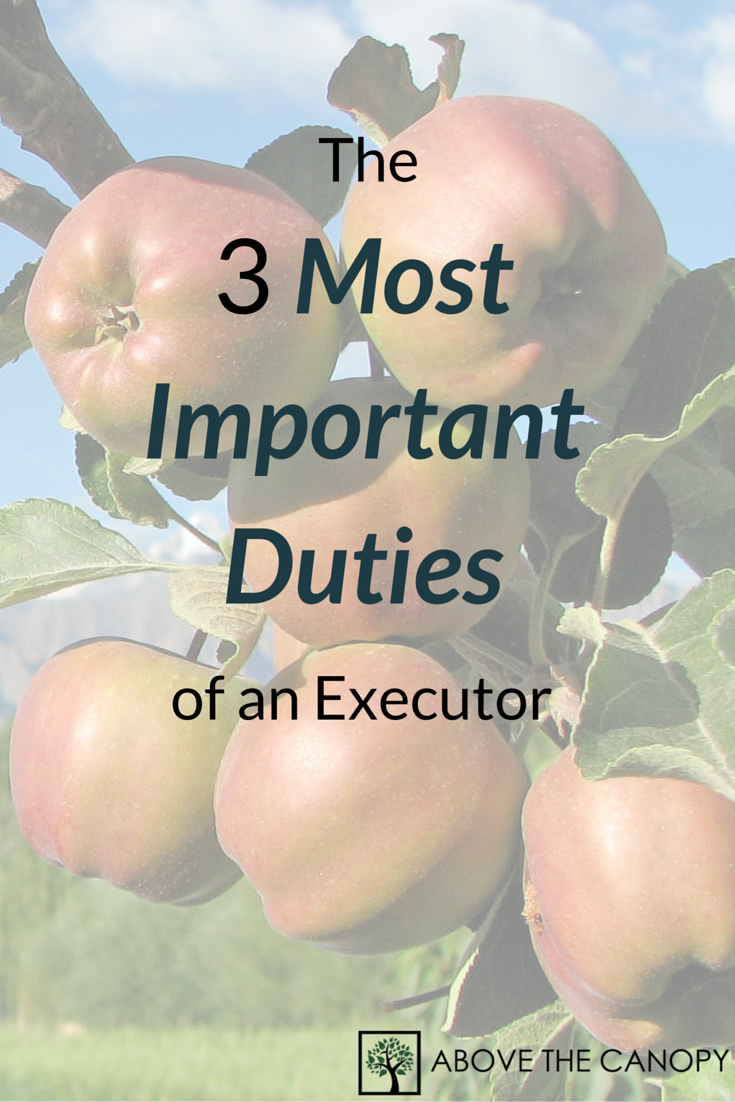Being named the executor of someone’s estate can be an honor, and comes with important duties and obligations. Unfortunately, you might be balancing this honor with the grief of losing a loved one.
The 3 Most Important Duties of an Executor
To start, if you’re nominated to be an executor you’re not required to accept the position. You might feel you need to accept in order to honor the deceased, but you’re by no means required to. If you decline to be an executor, a contingent executor will step in or the probate court will appoint one.
Legally speaking, executors are responsible for protecting the assets of the decedent (the person who died). This job lasts until the decedent’s assets are fully distributed to the appropriate parties.
Being an executor can come with legal liability if done imprudently, so it’s important to understand what you’re getting yourself into. Here are the 3 most important duties of an executor:
Executor Duty #1: Funeral Arrangements
One of the first duties of an executor is to help arrange the funeral and burial proceedings.
Many people have specific wishes and customs, so be sure to speak with family members to get input. Also, many estate planning attorneys help their clients draft a “letter of instruction” to be included in their estate documents. While it’s not legally binding, this letter lists some of the decedent’s wishes regarding their funeral arrangements.
Letters of instruction are usually included in a package of other estate planning documents, like wills and trusts. You’ll need these later anyway, so it’s best to find the package early on to use as a guide.
Around this same time, the funeral home will ask you how many copies of the death certificate you’d like.
Always request more than you think you’ll need. Death certificates might be required for many of the decedent’s financial accounts. These can include bank accounts, life insurance death benefits, or benefits from the Veterans Administration or Social Security Administration.
As for the Social Security Administration, be sure to notify them of the decedent’s passing as soon as possible. If Social Security benefits are paid after the date of death, it can be a hassle to return them.
Other accounts, like the death benefit of a life insurance contract, may require a doctor to sign off on the official cause of death.
Executor Duty #2: Getting Probate Started
After the funeral, you’ll need to begin settling the decedent’s estate. This can be one of the more complex duties of an executor, and many prefer to ask for help. Attorneys can be great guides here, as estate laws often differ significantly between states. In fact, probate judges tend to expedite the process for executors who’ve hired counsel.
You’ll also need to file a final tax return for the decedent, along with an estate tax form if their estate is large enough. A licensed CPA can help with this. Fees for these advisors can usually be paid from the estate’s assets, but again this also differs by state law.
To officially start the probate process, you’ll need to file a copy of the decedent’s will with the local probate court. The probate court reviews the will and ensures it’s valid. Once it does (which can take some time) you can distribute assets to the appropriate heirs. If the decedent did not have a will, they have died “intestate”. In this circumstance the probate court will decide how the decedent’s assets are to be distributed.
It’s important that you don’t touch the estate’s assets before the will is approved. Remember – it’s your job to protect them. Any tampering can get you into legal trouble. This can include selling assets at fire sale prices to pay the estate’s debts, or even letting family members pick through the decedent’s belongings.
Also keep in mind that there might be assets that don’t go through the probate process. Some assets are passed by contract (IRAs and 401(k)s with completed beneficiary forms).
Others might be passed by trust. Many people use living trusts in order to avoid probate, since probate takes time and is open to the public. If a trust is drawn up correctly, assets can be distributed immediately without waiting for probate court approval.
Executor Duty #3: Settling the Estate
Finally, you’ll need to settle the decedent’s estate. The first step here is to locate all of the decedent’s assets and liabilities. Well organized decedents will have a personal balance sheet among their estate documents that’s easy to find.
But as you know, not everyone is well-organized. For those who don’t have a personal balance sheet, it may take some work to locate everything. Experts suggest that monthly bills and bank records can provide clues. By getting a feel for the money going into and coming out of the decedent’s bank accounts, you can track down any undisclosed debts. Also look for contracts, deeds, tax returns, and any other financial statements.
Settling debts is an area many executors have questions about. The decedent’s estate is indeed responsible for paying any outstanding debts. But, if the debts exceed the estate’s total assets, potential heirs are not responsible for paying them.
As the executor, make absolutely sure that the estate has enough assets to cover all its debts before settling any of them. If the estate’s debts exceed assets, the probate court will prioritize the estate’s creditors for you.
Finally, the estate’s remaining assets can be passed to heirs with the probate court’s green light. Once the decedent’s final tax return and potential estate tax forms are filed, the probate court will consider the estate closed. At this point the estate is settled, and the executor is relieved of their duties.
The Wall Street Journal has an infographic on the toughest parts of the job. If you’re not sure you can perform the duties of an executor, remember that you can always ask for help or decline the position altogether.

